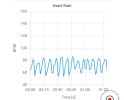SunnyK
Senior Member (Voting Rights)
For many years, and especially when I have PEM/ crash, I've found myself lying in bed, and breathing seems to take too much energy. A better way of describing it would be that if I don't wait from 5-10 seconds after a slow exhale, I get a buildup of tightness in my chest and can actually feel dizzy.
I didn't think about this much until I started doing meditative breathing to try to help insomnia, and the recommendation for one method was 4 count breath in, 6 count breath hold, 8 count breath out. Even though I sometimes felt like I needed a breath sooner than the eight count out, I would get a real tightness in my chest if I didn't sit still after the breath out for several seconds.
I awoke from my nap today and realized that this was pretty extreme, so I finally decided to measure my breaths per minute. Testing for one minute and then testing for 5 minutes/ 5, I get about four breaths per minute. Which is clearly way below normal.
I searched Google quickly to see if there were any reports about bradypnea with ME, But it seems that most people, if they have a breathing issue, have the opposite problem.
I do not use alcohol or opioids, but I am on a few sedating drugs to help me get the rest I need in the afternoon and at night. Wondering if these are the culprits, even though, while I have needed a bit more of these drugs over time, as I said this has been an issue for me for probably 15 years or so, although my sleep study in 2021 didn't mention it in the report.
I didn't think about this much until I started doing meditative breathing to try to help insomnia, and the recommendation for one method was 4 count breath in, 6 count breath hold, 8 count breath out. Even though I sometimes felt like I needed a breath sooner than the eight count out, I would get a real tightness in my chest if I didn't sit still after the breath out for several seconds.
I awoke from my nap today and realized that this was pretty extreme, so I finally decided to measure my breaths per minute. Testing for one minute and then testing for 5 minutes/ 5, I get about four breaths per minute. Which is clearly way below normal.
I searched Google quickly to see if there were any reports about bradypnea with ME, But it seems that most people, if they have a breathing issue, have the opposite problem.
I do not use alcohol or opioids, but I am on a few sedating drugs to help me get the rest I need in the afternoon and at night. Wondering if these are the culprits, even though, while I have needed a bit more of these drugs over time, as I said this has been an issue for me for probably 15 years or so, although my sleep study in 2021 didn't mention it in the report.
Last edited:

